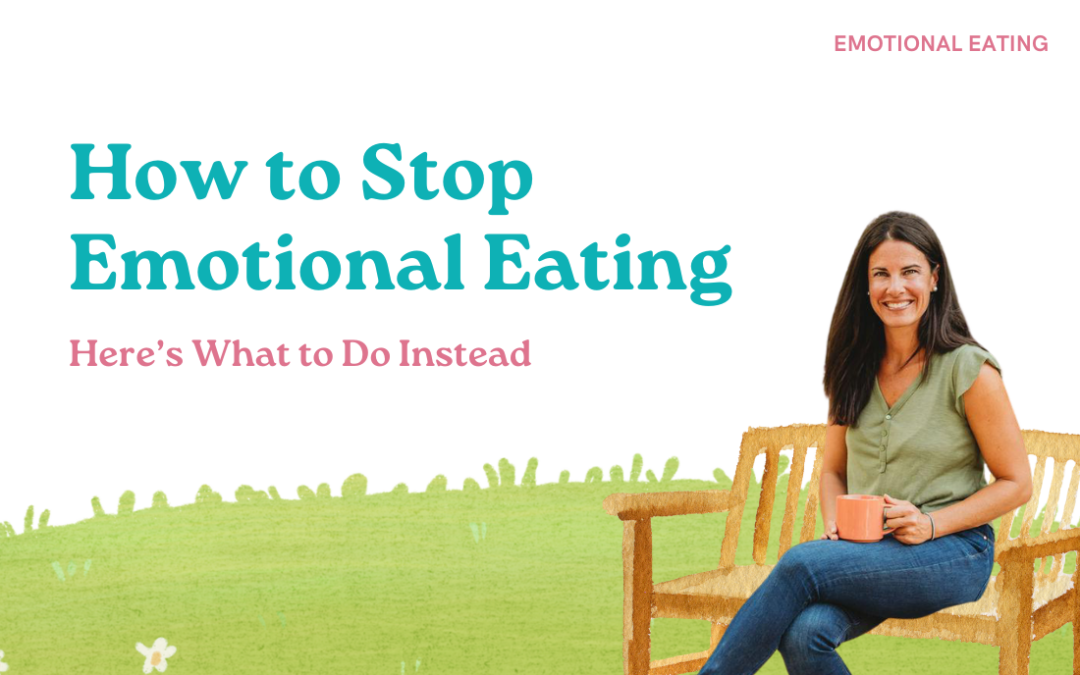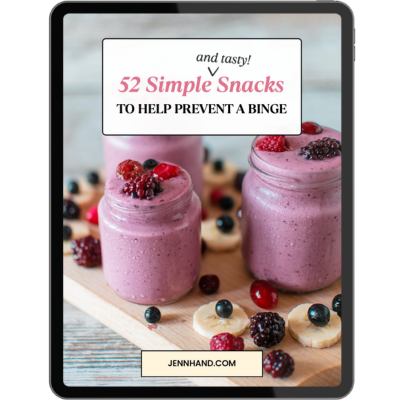Written by Jenn Hand, Holistic Nutritionist, Board Certified Health Coach, NBC-HWC
“Help, I want to stop emotional eating!”
Growing up, I didn’t learn how to deal with my feelings.
Anytime I experienced anything, whether it was disappointment, sadness, anxiety, fear, or stress, I used food. It became the way I dealt with life. Emotional eating is a common challenge that many women struggle with. We typically don’t learn how to express or process feelings, and food becomes an easy way to cope. If you struggle with feeling instead of eating, have no fear! It is an issue that can definitely be overcome. You CAN stop emotional eating.
In this post, I’ll cover how you can stop emotional eating and what to do instead.
Table of Contents
- The Emotional Eating Cycle
- What Causes Emotional Eating to Be Your “Go To” Coping Mechanism
- How to Overcome Emotional Eating Triggers
- What to Do INSTEAD of Emotional Eating
- How to Identify Your Emotional Eating Patterns
- What’s the Difference Between Emotional Hunger and Physical Hunger?
- What Causes Emotional Hunger?
- 5 Ways to Nourish Yourself Emotionally without Eating
- Super Common Emotional Eating Triggers
- Emotional Eating vs. Binge Eating
- Acknowledging the Effects of Emotional Eating
- When to Seek Professional Help
- Speak with an Emotional Eating Coach
- Common Questions about Ending Emotional Eating
- Decide On Your Next Best Move to Stop Emotional Eating
The Emotional Eating Cycle
While the emotional eating cycle may have different variations, it usually looks something like this:
- Experience a challenging life situation (loss of a loved one, work layoff, breakup, etc)
- Feel a strong emotion (grief, disappointment, sadness, anxiety, etc)
- Turn to food (for comfort, to cope, as a relief, etc)
- Blame or punish yourself and promise to not eat emotionally again
- Experience a challenging life situation (and the cycle continues)
For me, this wasn’t a conscious cycle at first. I wasn’t aware that when I felt something I immediately turned to food. It was the recognition of the pattern that enabled me to begin “doing” something about it.
You can’t change what you aren’t aware of, so if you do recognize yourself in this pattern, that’s good news!
It means you can now work to heal it. Sometimes going it alone can be tough. Working with an emotional eating coach is a great option for people who want more support and want to find food freedom more quickly.
What Causes Emotional Eating to Be Your “Go To” Coping Mechanism
For those of us who’ve struggled with food, we typically turn to eating because we didn’t grow up learning how to deal with emotions. We were taught to stuff down our feelings as we grew up. Whether it’s because it wasn’t socially acceptable, we tried hard to be the “good one,” our family didn’t express feelings and we had no clear examples, or any other reason, food became our way to deal with life.
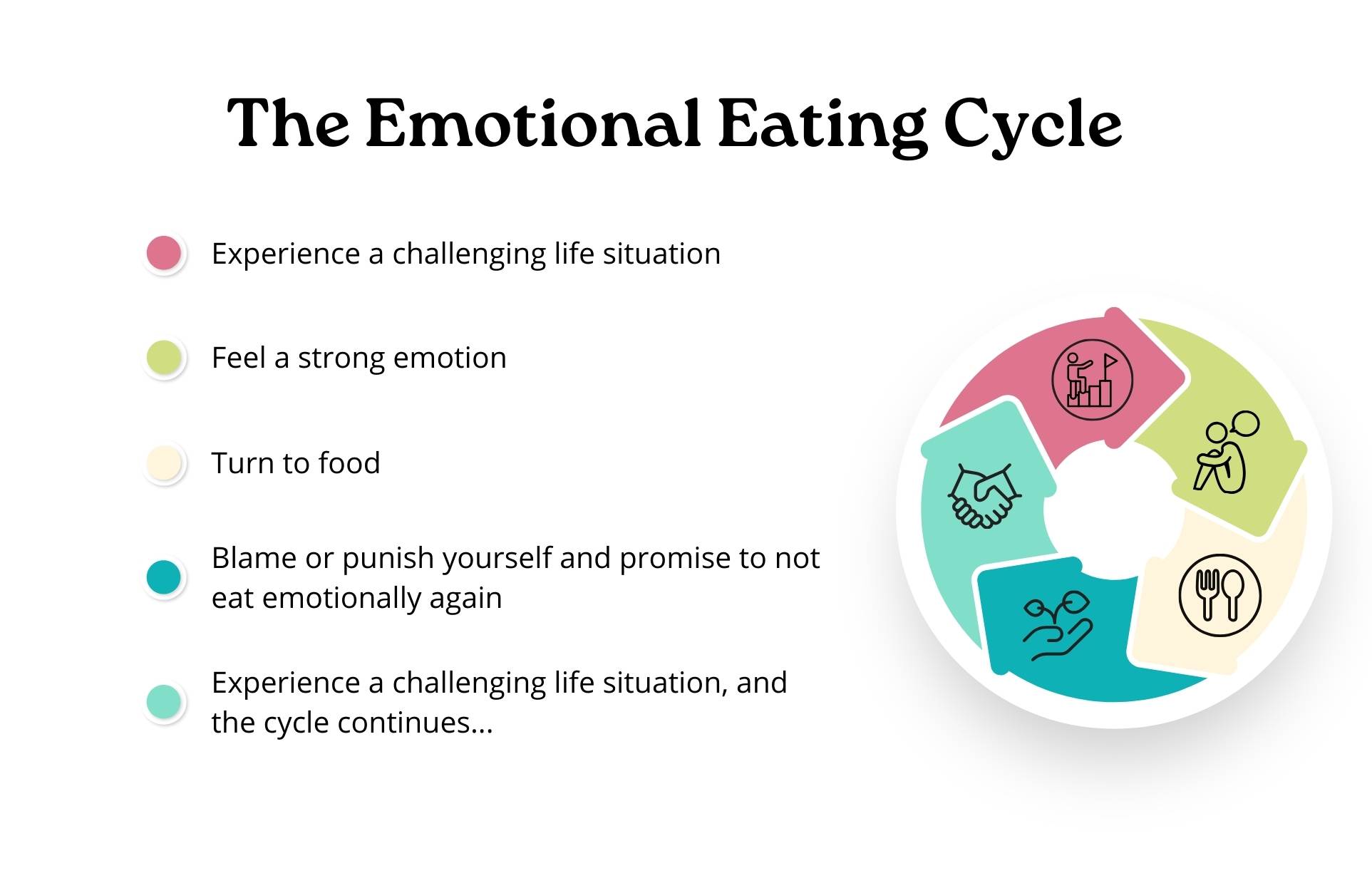
How to Overcome Emotional Eating Triggers
1. Keep a Food Diary
It can be really helpful to journal about what and when you eat.
This is not a “counting, weighing, measuring diet-y” type of food journal. Its intention is totally different: to help you understand patterns, stuck points, and trouble spots during the day. Typically, if my clients are open to it, I’ll have them write down just the time they are and generally what they ate. This way, we can look at where they have trouble during the day and how we can solve the issue!
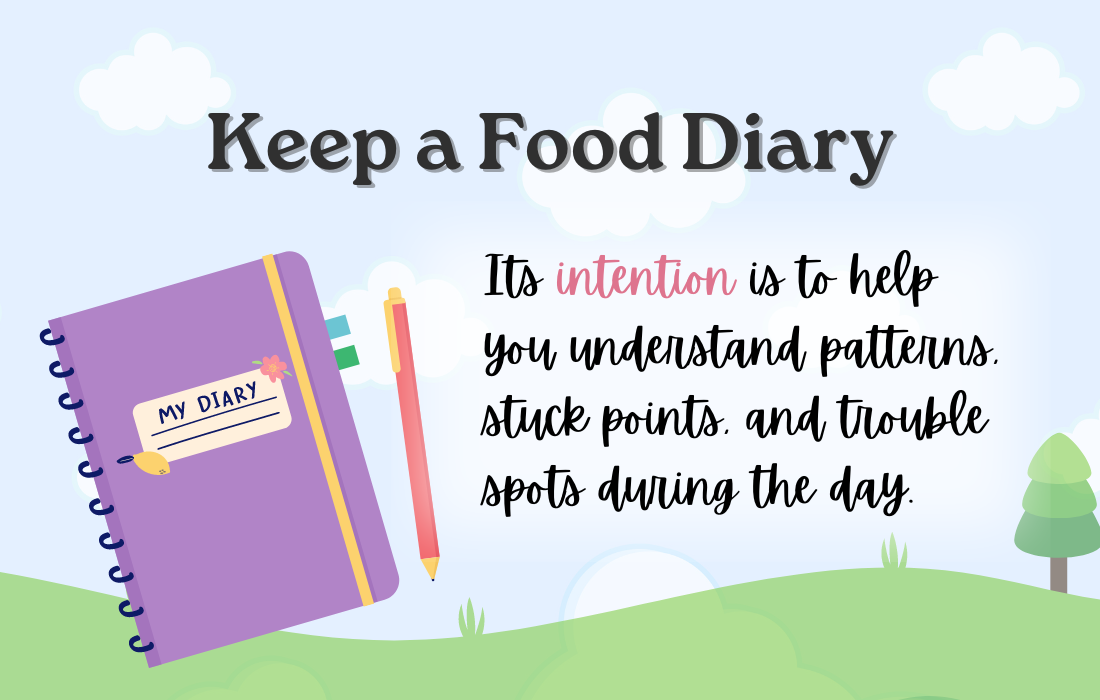
2. Start an Emotion Diary
Take the food diary one step further and add your emotions!
There is no wrong way to do it. You can write one word of how you were feeling before and after you ate. Or you can write a sentence or two after you eat about what was going on or what you were thinking about or feeling. This will help you pinpoint exactly what emotions send you to the food so that you can create a plan to explore the feeling instead of eating over it.
3. Find other ways to cope
For those of us who emotionally eat, we’ve usually never learned to actually cope with feelings.
So instead of blaming ourselves, know that this is just the way we learned to deal with life! A part of letting go of emotional eating is to find other ways to cope. Some of my favorite tools are journaling, meditating, some yoga breathing or a few poses, and a walk in nature. Experiment with how to express emotions! It could be through art journaling, coaching, a rage room, writing, leaving voice notes to yourself, tapping, or anything creative that helps move you through a feeling!

4. Indulge without Overeating by Savoring Your Food
When we are slowing down and present with what we are eating, it’s hard to overeat.
If you’re having a challenging day, maybe you pick more of a “comfort food” type of dinner. Savor it, enjoy it and relish it! Not all emotionally eating is “bad.” Sometimes we share food as a community, have a glass of wine after a long work week or gain comfort from an old family recipe. It’s when food becomes our go-to for dealing with all of life’s emotions when it becomes an issue.
5. Get Support
If we haven’t learned how to deal with life, it can be helpful to get deeper support to learn how to actually “feel” emotions.
We aren’t usually taught this growing up (unless we were lucky!) Explore coaching, group work, self-expression, breathing exercise and other tools that call to you.
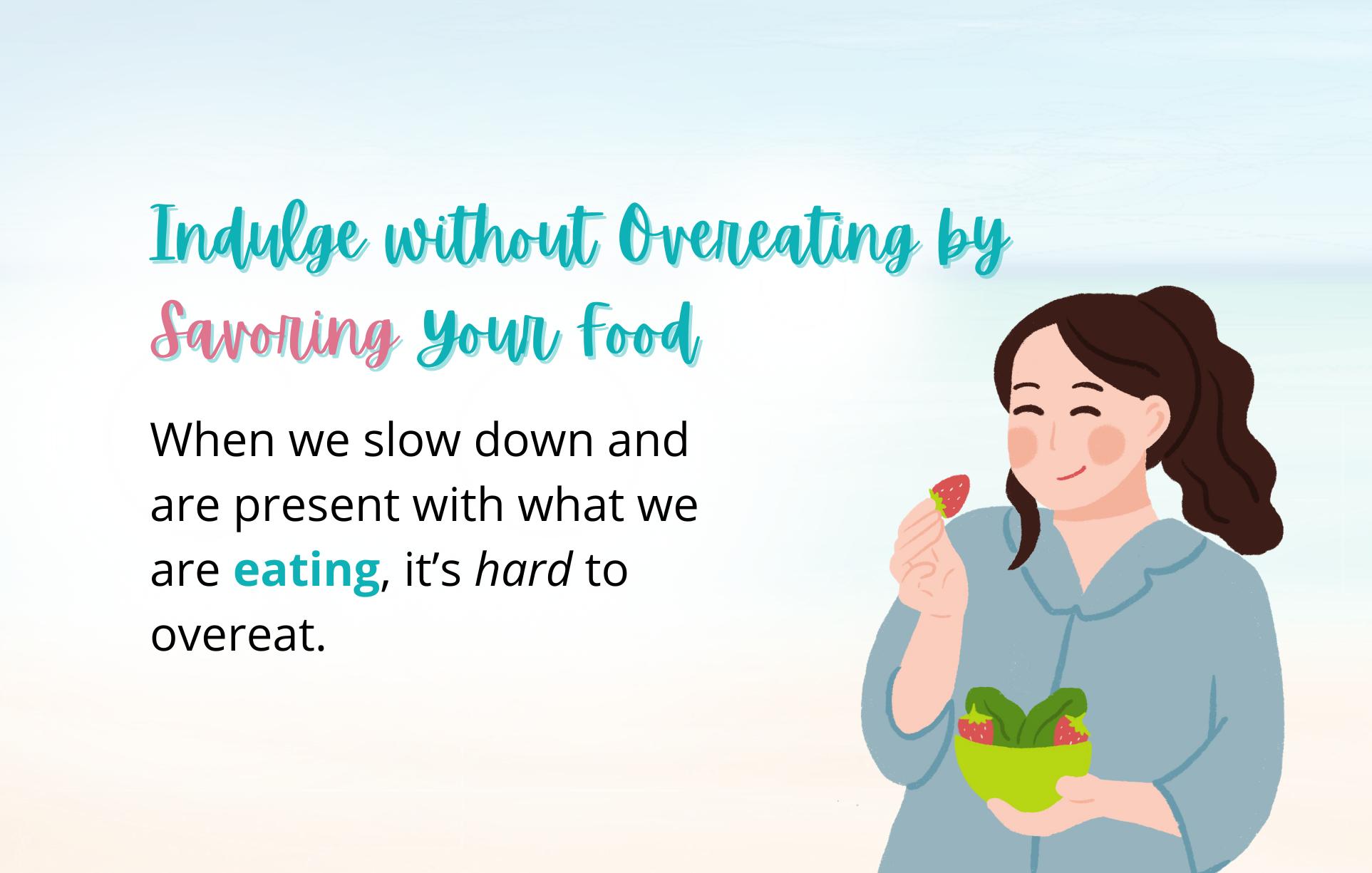
6. Pause when Cravings Hit and Check In with Yourself
One of my favorite 12 step group acronyms is H.A.L.T.
It’s a reminder to pause whenever you’re Hungry, Angry, Lonely or Tired to check in with yourself to ask if eating is really going to do what you want it to do. Taking a few deep breaths or just closing your eyes for 10 seconds to pause can be immensely helpful in allowing a craving to be there while you explore the cause.
7. Identify Healthy Choices and Try Some Out
There are times when a good ole fashioned substitute can be helpful!
If you’re craving ice cream in the evening after dinner, could you make a list to experiment with some other more nutritious snacks? Try out popcorn, chocolate rice cakes with peanut butter, grapes and some cheddar cheese, or frozen fruit with Greek yogurt. This solution may not always work, but it can be a good experiment!

8. Find Other Ways to Nurture Yourself Emotionally
This was one of my biggest learning curves on this journey.
I didn’t know what nurtured me emotionally because I spent my whole life eating over whatever I felt. I journaled a lot about what felt nourishing to my soul. It took some trial and error, but along the way, I discovered that yoga, meditation, journaling, nature and calming music all helped me process challenging emotions.
9. Practice Mindful Eating
Mindful eating can be super cliché advice, but it is a great practice!
While it’s not realistic to mindfully eat every meal of the day, see if you can mindfully eat a few bites or eat dinner distraction-free. Practicing slowing down helps you be more in tune with your emotions, which helps you process them rather than eat over them!

10. Forgive Yourself If You Eat Emotionally aka. No Punishment Required
I always say that “food is a message.”
When we overeat or emotionally eat, it can teach us a lesson about what we were feeling (or trying to escape feeling!) When you do emotionally eat, reflect on what you were feeling. Were you overwhelmed? Did someone at work drive you nuts? Were you stressed about too many things on your plate? Did your partner do/not do something that you deeply resented? Forgive yourself and see if you can be open to the lesson.
11. Recognize what Drives You to Eat When You’re Not Hungry
Boredom was a big driver to eat for me when I wasn’t hungry.
I also felt this low level angst where I sort of just felt uncomfortable and antsy. Both of these drove me to eat. Take a look at what triggers or emotions send you to the food. This can help you create an action plan ahead of time.

What to Do INSTEAD of Emotional Eating
I used to have a post-it note on my fridge titled “things to do instead of eat” to help remind me that I had tools to use besides food.
Here are some of my favorites: journal, call my sister, snuggle my dog, declutter a drawer or my closet, go out for a walk, drive to a bookstore, or get lost in an addictive novel.
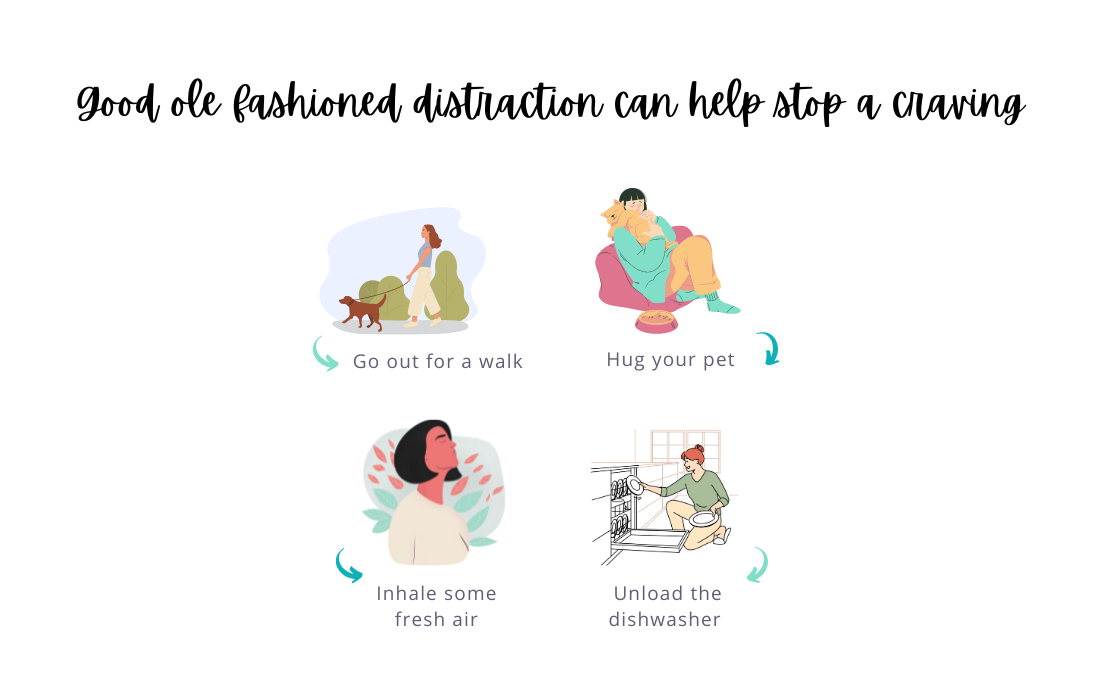
How to Identify Your Emotional Eating Patterns
It can be helpful to keep a journal to see the link between where you’re eating for fuel and where you’re eating emotionally.
The “witching hour” for many people is in the late afternoon and evening. Take a look at those times of day, usually between 3pm-6pm and 8pm-bedtime, to see if you eat or snack due to any feeling or underlying reason. You may have another time of day where you eat emotionally, so it can be helpful to reflect on the times you do overeat (by journaling or thinking about it) so you can identify your patterns!

What’s the Difference Between Emotional Hunger and Physical Hunger?
Physical hunger is a biological need for fuel, whereas emotional hunger is a desire for food to help deal with a feeling. A key difference is that physical hunger can be satisfied by eating, where eating for emotional hunger doesn’t really “satisfy” the core desire (a need to express or process an emotion.)
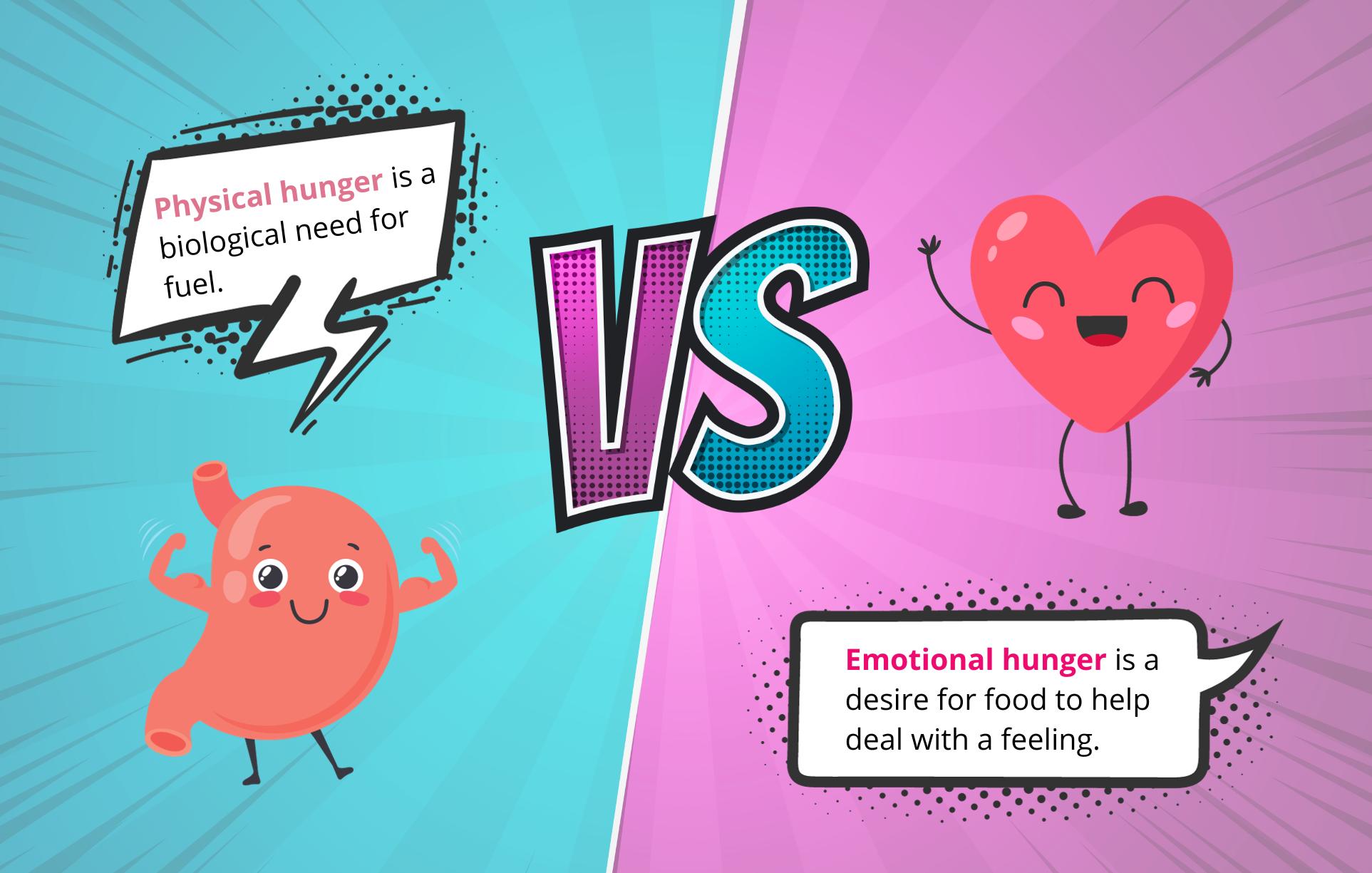
What Causes Emotional Hunger?
Emotional hunger can be caused by a desire to comfort yourself, soothe some inner hurt, numb a painful emotion or distract from a challenging emotional situation. A need for food emotionally is usually because we aren’t quite sure how to handle whatever emotions we’re experiencing or obstacles life throws our way.
5 Ways to Nourish Yourself Emotionally without Eating
1. Journaling
There’s something about writing that brings clarity! When we get stuck and muddled in the ping-pong patch that can happen in our brains, we can feel stuck. The power of writing can bring clarity and help express emotions.
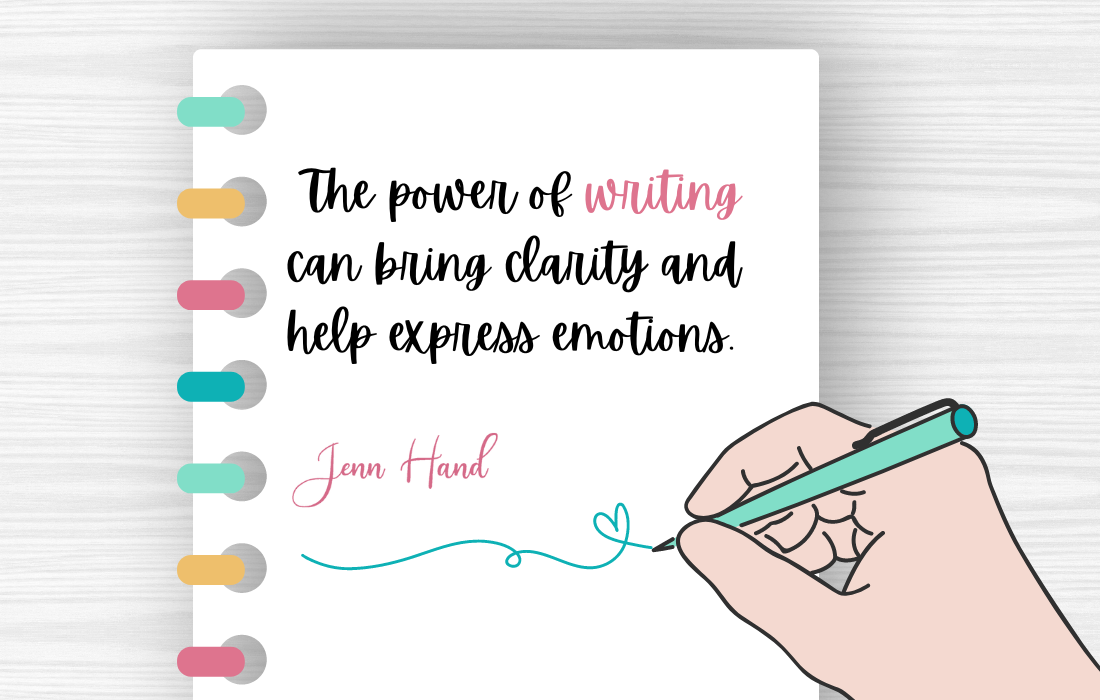
2. Your favorite self-care
I love laying on my floor and putting on my favorite relaxing music for 5-10 minutes. Experiment with different types of self-care to support you as you move through an emotion: a yoga class or some yoga poses, a hot bubble bath, a walk around the block, dog snuggles or anything in between!
3. Immersing yourself in nature
Nature is powerful and healing! A quick walk in the park, a 5 minute stop at the creek, a mountain hike, immersing yourself in a garden or any other “nature-y” time can bring you back to balance in no time at all.

4. A guided meditation
If you struggle with meditation, a guided one may do the trick. There are tons of meditation videos on Youtube or feel free to try out the Insight Timer app (it’s free!) A quick 5-8 minute guided meditation can help you release whatever feelings you may feel stuck in.
5. Reading an inspirational book
I used to have Geneen Roth’s books on my nightstand for a quick pick me up. Check out some of my favorite inspirational authors (Elizabeth Gilbert, Brene Brown) or an uplifting book that may give you some space to process as you read inspiring life (or food freedom related) words of wisdom.
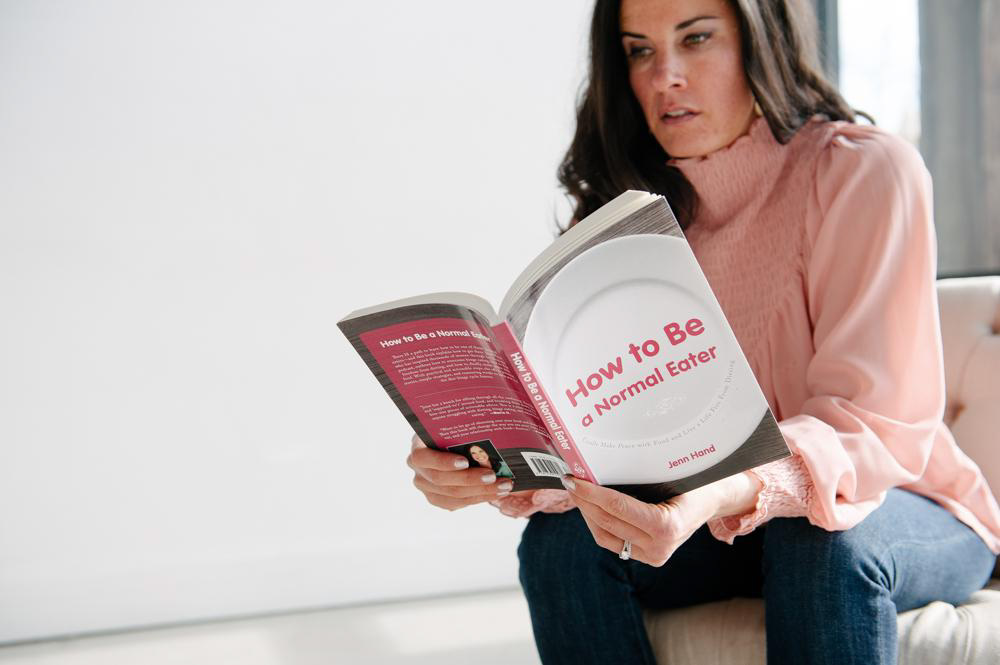
Super Common Emotional Eating Triggers
- Reward at the end of a long day
Many times food becomes our reward for a long day filled with endless, exhausting mundane tasks. It’s an “excitement” to look forward to.
- Too many to-do’s and not enough support
When we’re overwhelmed with the many things on our life to-do list, eating can seemingly fill in as a relief for too much to do.
- Dealing with uncertainty
Uncertainty is a scary feeling. As humans, we want to know and be certain of what will happen. When health issues arise, a job situation is shaky, a relationship is on the rocks or any other uncertain situation, food can feel like it helps us cope.
- Loneliness or lack of connection
Despite being connected via technology so much of the time, as a society, we are lonelier than ever. We may seek connection or solace in food when we feel a sense of loneliness.
- Boredom or lack of purpose
When we’re bored, food can be something to do. It’s a seemingly easy solution to something and gives us an action to do with our hands and mouth.
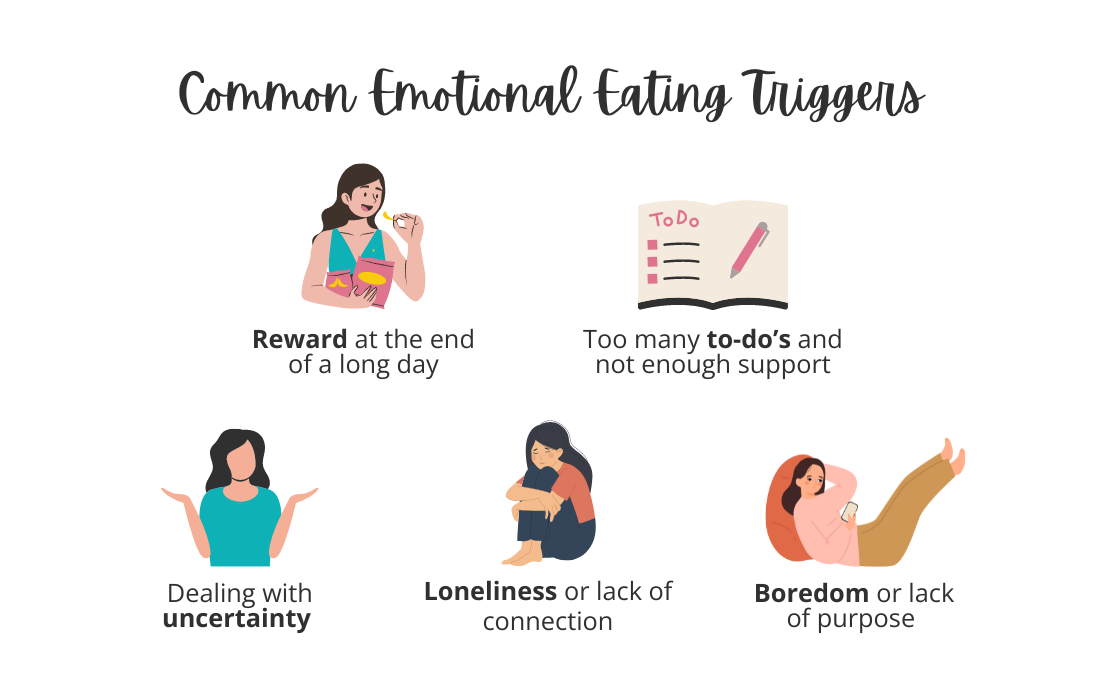
Emotional Eating vs. Binge Eating
We may binge emotionally, but emotional eating does not always result in a binge. Binge eating is categorized by an out of control, compulsive feeling while you eat. Emotional eating may not always be compulsive. It is usually in response to a negative emotion or situation that triggers the desire to eat for comfort or to deal with a feeling. You can emotionally eat without it being a binge.
Acknowledging the Effects of Emotional Eating
It’s important to acknowledge that emotional eating can impact our life. I tried to hide my struggle for a long time, as I was embarrassed about my habits. And while I didn’t think it impacted my life in a big way, it did. Not only that, I felt guilty after, blamed myself and got stuck in a negative thought spiral both mentally and emotionally. It’s okay to struggle and recognize you may need extra support!
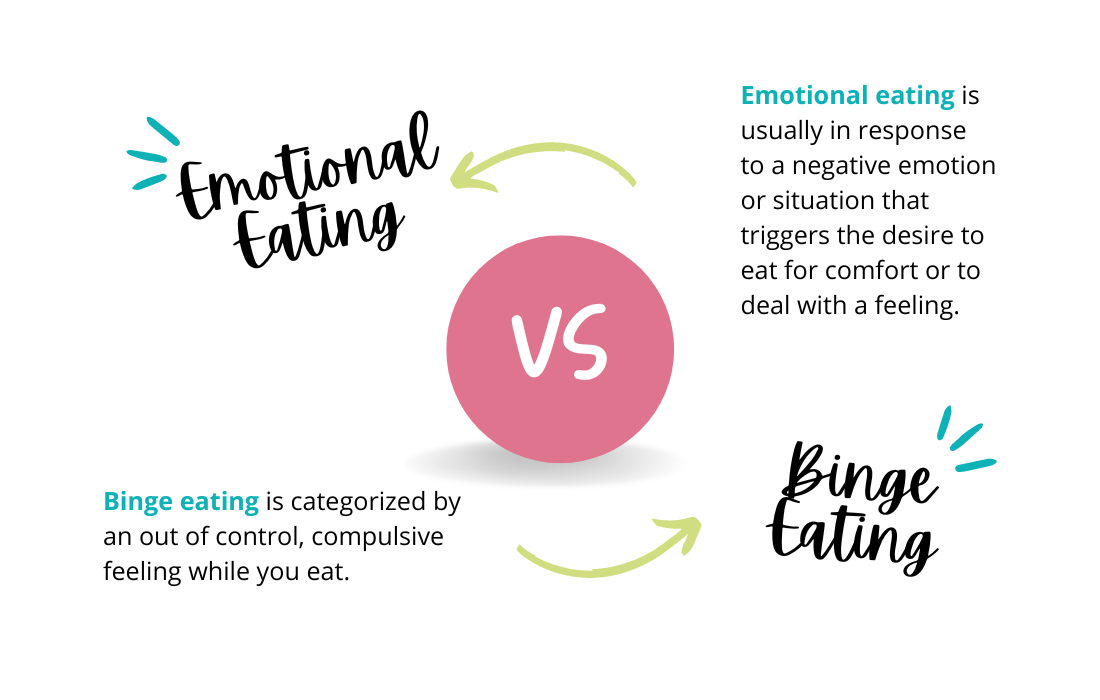
When to Seek Professional Help
If you feel like you’re unsure exactly how to feel your feelings and you turn to food to cope with life, exploring support may be beneficial. Professional help can help you identify how to shift patterns and habits you can’t normally “fix” yourself. If you’re unsure if seeking out help is for you, grab your journal and explore this topic!
Write about fears, doubts, uncertainties and ask for guidance. My journal has helped me decide many things over the years!
Speak with an Emotional Eating Coach
Working with someone who specializes in helping you stop emotional eating can be life changing. Learning how to feel my feelings was invaluable for me on this path! And I wasn’t able to do it alone.
Working with someone 1:1 can help bring clarity, allow you to identify and move through stuck points, and bring about life-changing shifts to break free from emotional eating.
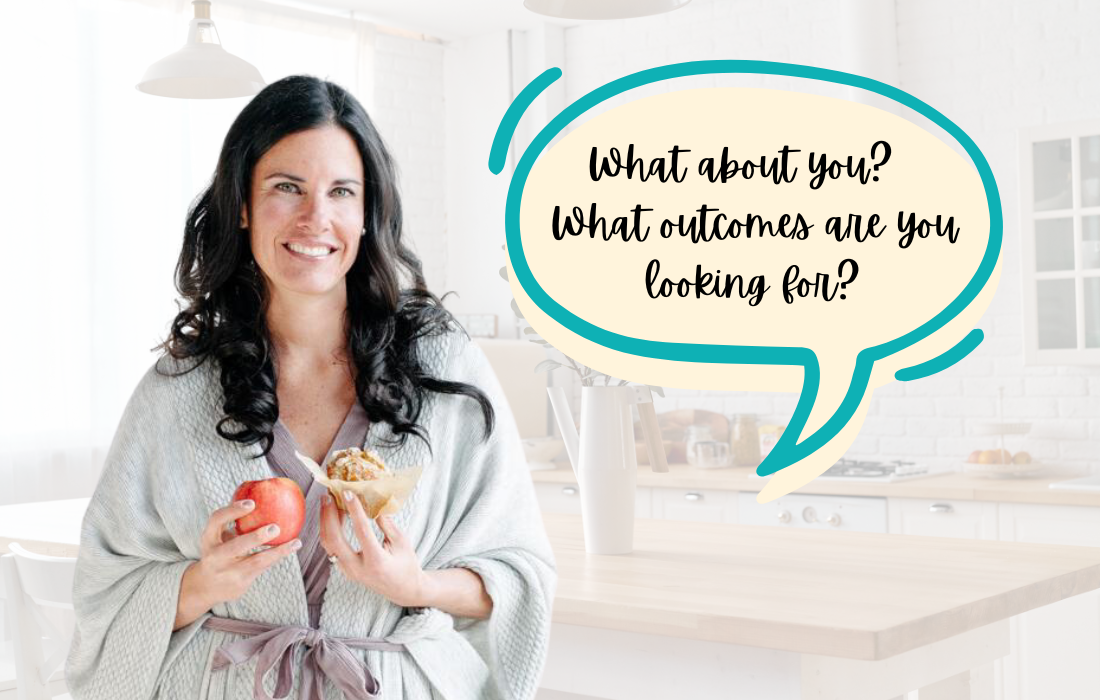
Common Questions about Ending Emotional Eating
Why is food comforting?
Despite the “food is simple” message society hammers us with, eating is actually very complex. Food isn’t just physical fuel, it can also be comforting, pleasurable, build community, and seemingly soothe stress. When we overeat, we typically eat high sugar or high carb foods, and these are the “feel good” foods. If we eat something sweet, dopamine is released in our brains, giving us a comforting, good feeling.
Why do people overeat?
People can overeat for a variety of reasons. Some physical reasons include: not eating enough protein during the day, eating too little, being trapped in the diet cycle and not eating food that is satisfying. Other times people eat more for emotional reasons: to soothe a broken heart, to deal with grief, to ease a broken relationship, as a pick-me-up when feeling down, or other emotional struggles.
Why do people eat their feelings?
Food can give us the illusion that our problems go away when we eat. Food can seem to stop time, to halt the problem, to ease stress or hard life situations. In reality, the problems don’t go away, they just fade into the background. Instead of dealing with the problem that sent us to the food, we end up getting trapped and fixated on the “food problem.”
We will beat ourselves up, promise we won’t eat anymore, maybe start a new diet, and fixate on food/weight, while the problem lingers in the background. Unfortunately, the problem doesn’t get resolved but will come back until we deal with it.
Why do I eat when I’m stressed?
When we’re stressed, problems can seem large and overwhelming, and food can seem easy and like it’s always “there.” Usually, our brains are running at high speeds during stress, and we feel overwhelmed physically and emotionally. Food is simply an “easy solution” instead of dealing with our problems.
Decide On Your Next Best Move to Stop Emotional Eating
If you’d like to get more support on this journey, check out the “Break Free from Emotional Eating” challenge! It’s designed to help you stop emotional eating (without using willpower or force!)
More Articles About Emotional Eating
⚪ Best Books on Emotional Eating
⚪ 3 Things To Know About Emotional Eating
⚪ The One Thing You Must Know To End Emotional Eating For Good
Get the Normal Eater’s Newsletter
Join 8000+ women who are overcoming overeating, binge eating, and breaking up with dieting forever. Get Jenn’s inspiring and actionable weekly newsletter with the latest posts, podcasts, and tips on how to love your body, find food freedom, and lose weight holistically.
Get the Normal Eater’s NewsletterWork with an Emotional Eating & Holistic Nutrition Coach
Overcome Bingeing and Emotional Eating, and Break Up with Yo-yo Dieting
Working with an emotional eating coach and holistic nutritionist can help you get free from the frustrating binge and restrict cycle and stop yo-yo dieting.
You don’t have to be obsessed with food or have a million rules around eating to find your natural weight and learn to love your body. Ready to actually see a lasting change and experience true freedom?
Schedule a 20-min CallAbout the Author:
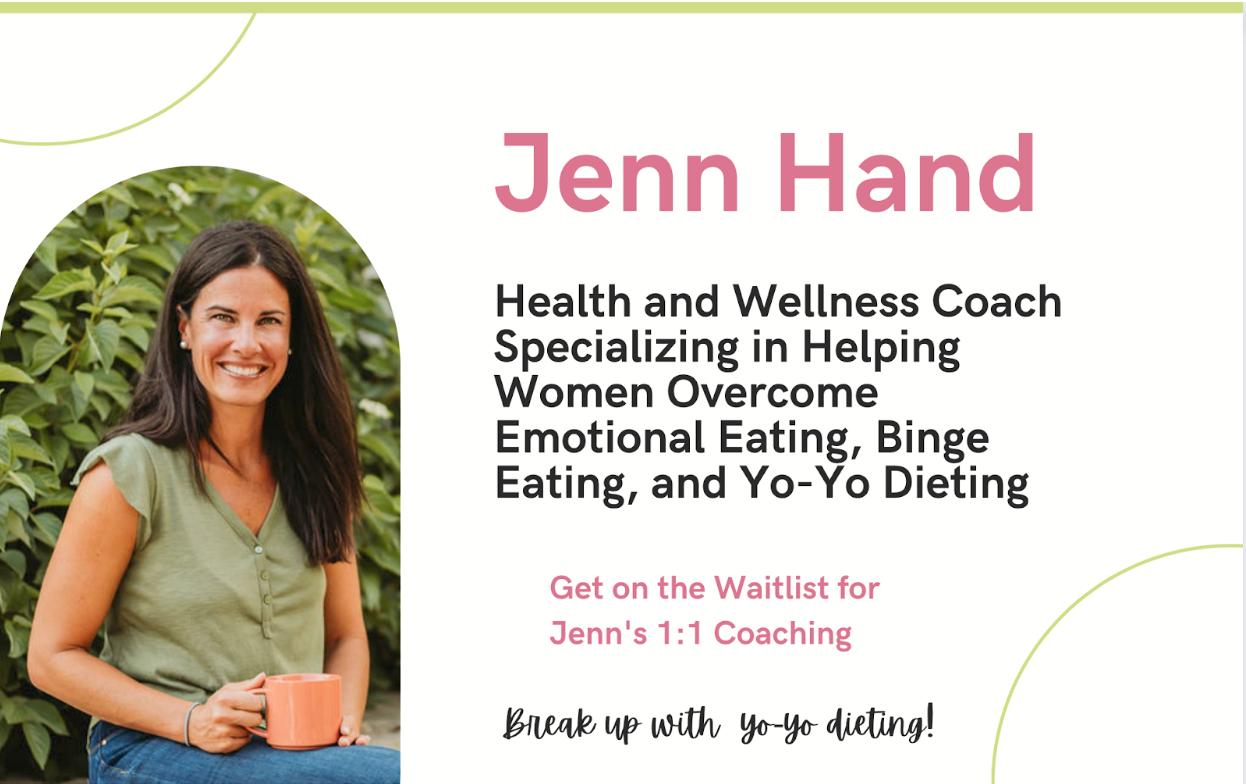
Jenn Hand has been helping women like you become normal eaters since 2015.
She’s worked with thousands of women, helping them to balance their bodies, end bingeing, stop obsessing over food, and start feeling amazing again. As a board-certified health coach and holistic nutritionist, Jenn knows how to support you in making real positive changes that last.
Her articles have been published on Mind Body Green, Tiny Buddha, Thrive Global and other local and global media platforms. She’s the author of How to Be a Normal Eater and the creator of The Normal Eater’s Club program. Listen to Jenn’s advice and tips on the Cake Doesn’t Count Podcast, or read more of her articles for free on the Food Freedom Blog.
Learn About Coaching!
